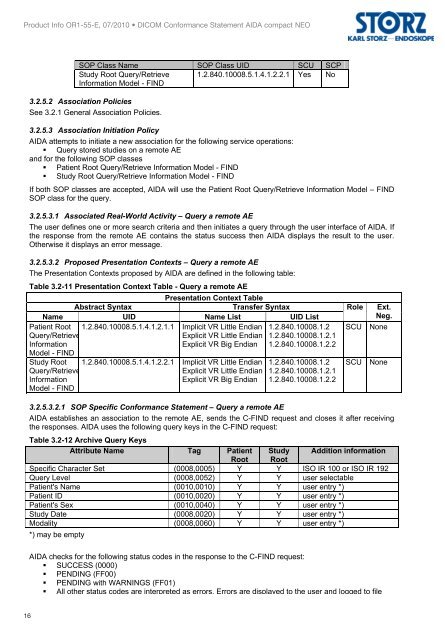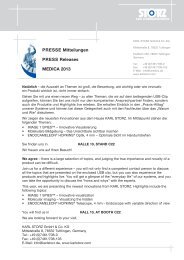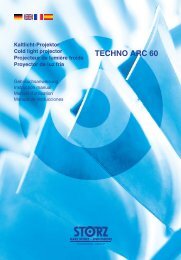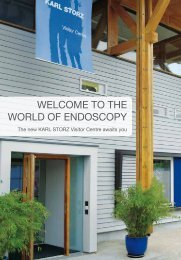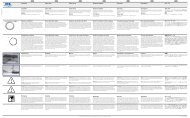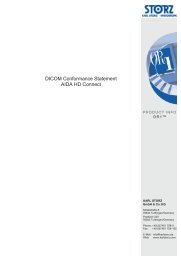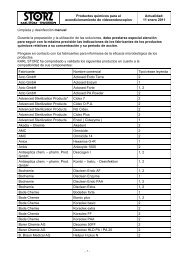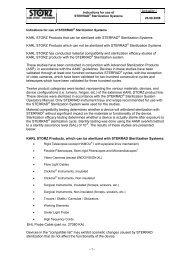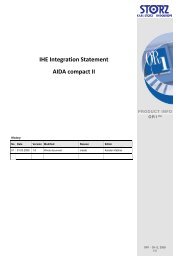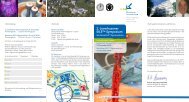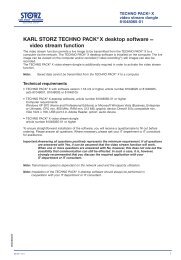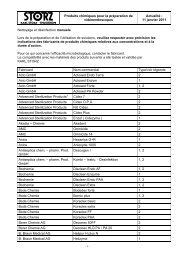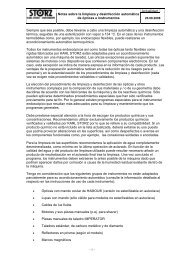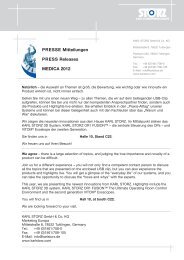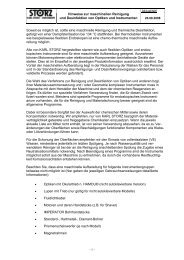DICOM Conformance Statement AIDA compact NEO - Karl Storz
DICOM Conformance Statement AIDA compact NEO - Karl Storz
DICOM Conformance Statement AIDA compact NEO - Karl Storz
Create successful ePaper yourself
Turn your PDF publications into a flip-book with our unique Google optimized e-Paper software.
Product Info OR1-55-E, 07/2010 • <strong>DICOM</strong> <strong>Conformance</strong> <strong>Statement</strong> <strong>AIDA</strong> <strong>compact</strong> <strong>NEO</strong><br />
<strong>DICOM</strong> <strong>Conformance</strong> <strong>Statement</strong> - <strong>AIDA</strong> <strong>compact</strong> 3.0<br />
SOP Class Name SOP Class UID SCU SCP<br />
Study Root Query/Retrieve 1.2.840.10008.5.1.4.1.2.2.1 Yes No<br />
Information Model - FIND<br />
3.2.5.2 Association Policies<br />
See 3.2.1 General Association Policies.<br />
3.2.5.3 Association Initiation Policy<br />
<strong>AIDA</strong> attempts to initiate a new association for the following service operations:<br />
Query stored studies on a remote AE<br />
and for the following SOP classes<br />
Patient Root Query/Retrieve Information Model - FIND<br />
Study Root Query/Retrieve Information Model - FIND<br />
If both SOP classes are accepted, <strong>AIDA</strong> will use the Patient Root Query/Retrieve Information Model – FIND<br />
SOP class for the query.<br />
3.2.5.3.1 Associated Real-World Activity – Query a remote AE<br />
The user defines one or more search criteria and then initiates a query through the user interface of <strong>AIDA</strong>. If<br />
the response from the remote AE contains the status success then <strong>AIDA</strong> displays the result to the user.<br />
Otherwise it displays an error message.<br />
3.2.5.3.2 Proposed Presentation Contexts – Query a remote AE<br />
The Presentation Contexts proposed by <strong>AIDA</strong> are defined in the following table:<br />
Table 3.2-11 Presentation Context Table - Query a remote AE<br />
Presentation Context Table<br />
Abstract Syntax<br />
Transfer Syntax<br />
Name UID Name List UID List<br />
Patient Root<br />
Query/Retrieve<br />
Information<br />
Model - FIND<br />
Study Root<br />
Query/Retrieve<br />
Information<br />
Model - FIND<br />
1.2.840.10008.5.1.4.1.2.1.1 Implicit VR Little Endian<br />
Explicit VR Little Endian<br />
Explicit VR Big Endian<br />
1.2.840.10008.5.1.4.1.2.2.1 Implicit VR Little Endian<br />
Explicit VR Little Endian<br />
Explicit VR Big Endian<br />
1.2.840.10008.1.2<br />
1.2.840.10008.1.2.1<br />
1.2.840.10008.1.2.2<br />
1.2.840.10008.1.2<br />
1.2.840.10008.1.2.1<br />
1.2.840.10008.1.2.2<br />
Role Ext.<br />
Neg.<br />
SCU None<br />
SCU None<br />
3.2.5.3.2.1 SOP Specific <strong>Conformance</strong> <strong>Statement</strong> – Query a remote AE<br />
<strong>AIDA</strong> establishes an association to the remote AE, sends the C-FIND request and closes it after receiving<br />
the responses. <strong>AIDA</strong> uses the following query keys in the C-FIND request:<br />
Table 3.2-12 Archive Query Keys<br />
Attribute Name Tag Patient Study Addition information<br />
Root Root<br />
Specific Character Set (0008,0005) Y Y ISO IR 100 or ISO IR 192<br />
Query Level (0008,0052) Y Y user selectable<br />
Patient's Name (0010,0010) Y Y user entry *)<br />
Patient ID (0010,0020) Y Y user entry *)<br />
Patient's Sex (0010,0040) Y Y user entry *)<br />
Study Date (0008,0020) Y Y user entry *)<br />
Modality (0008,0060) Y Y user entry *)<br />
*) may be empty<br />
<strong>AIDA</strong> checks for the following status codes in the response to the C-FIND request:<br />
SUCCESS (0000)<br />
PENDING (FF00)<br />
PENDING with WARNINGS (FF01)<br />
All other status codes are interpreted as errors. Errors are displayed to the user and logged to file<br />
16 Vers.: BB - confidential - property of <strong>Karl</strong> <strong>Storz</strong> GmbH & Co. KG -16/31-


